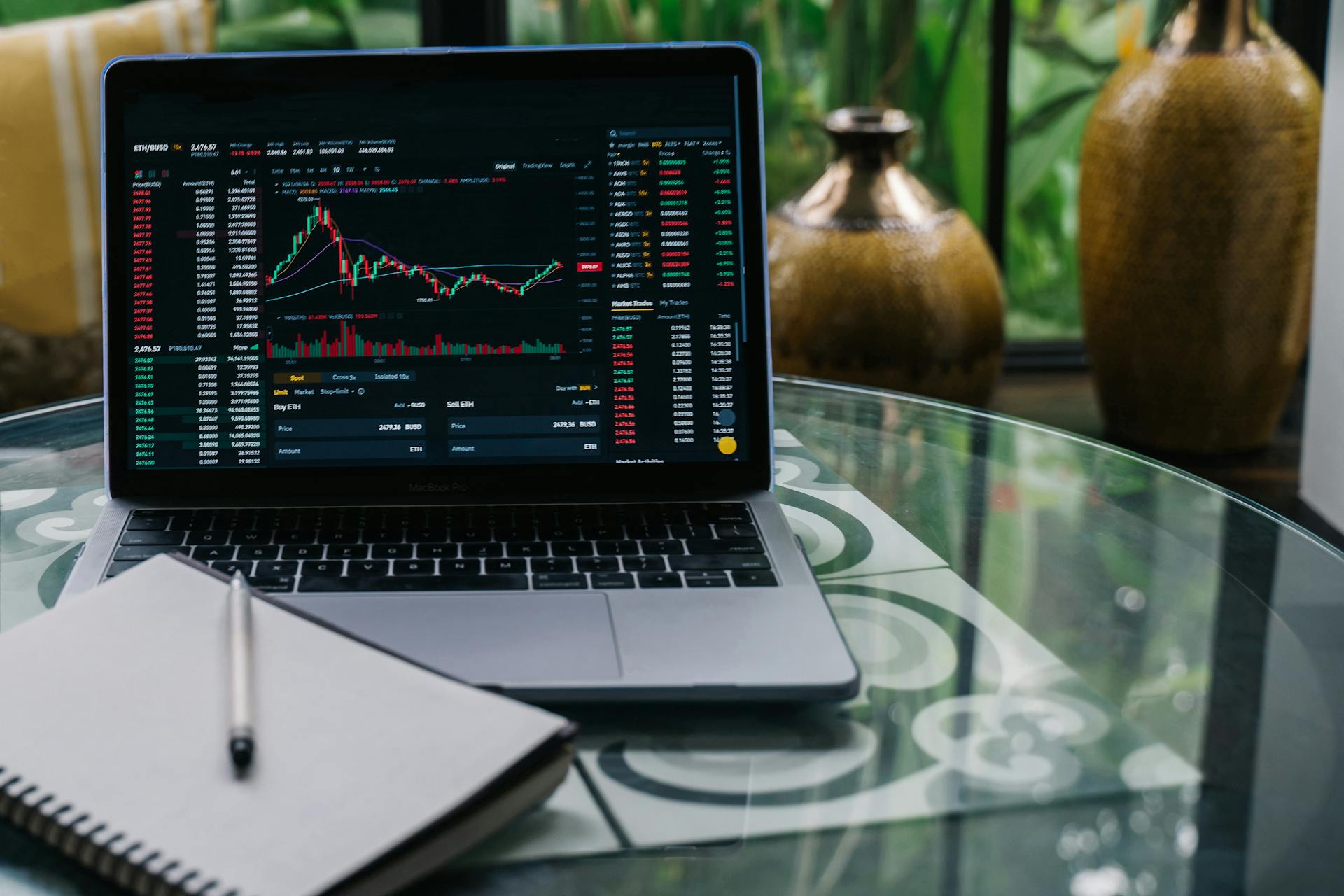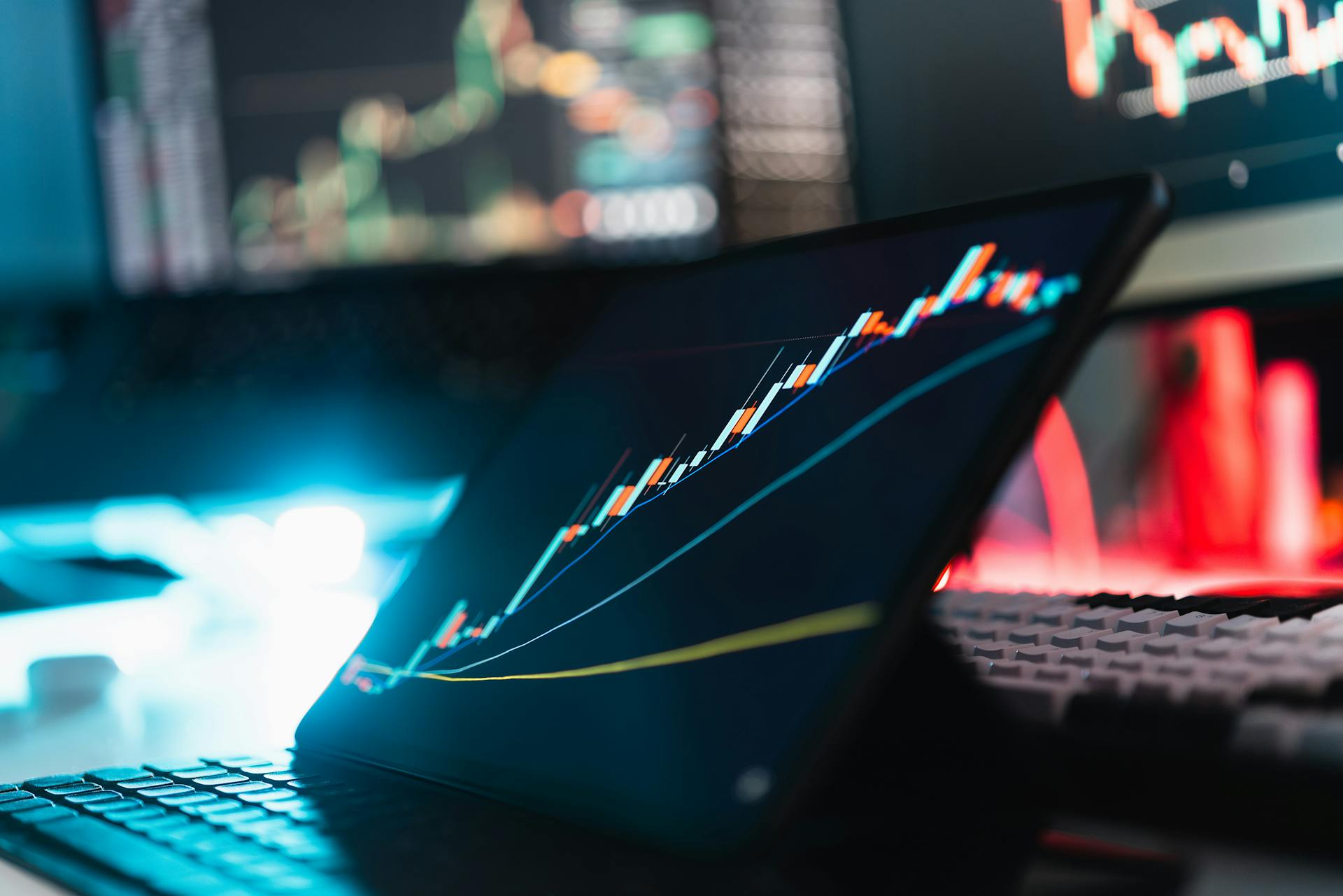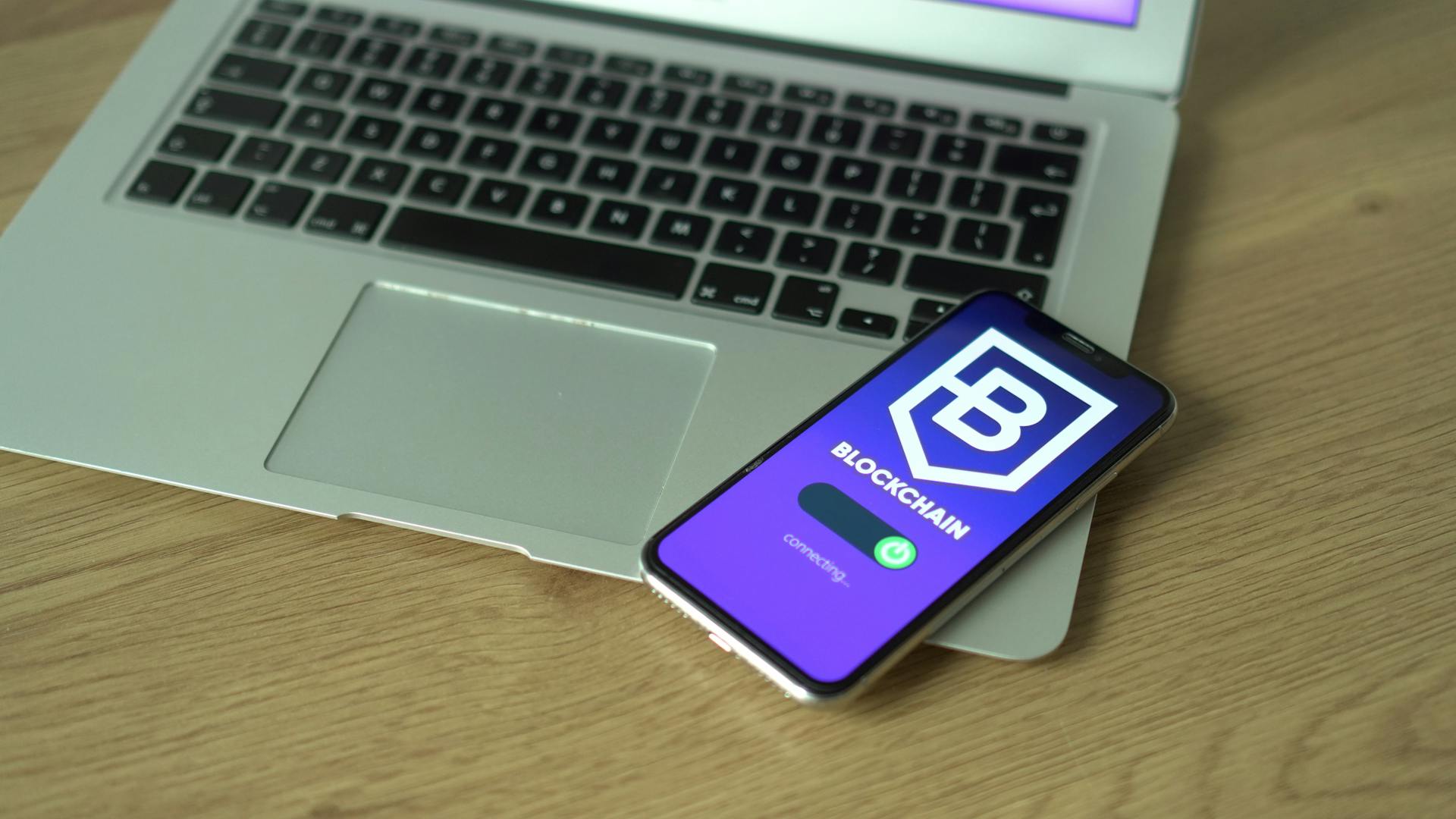
Ripple Labs has made significant strides in the world of cryptocurrency and blockchain technology. Founded in 2012 by Chris Larsen and Jed McCaleb, the company has been at the forefront of innovation in the industry.
Ripple's technology has been used by over 200 banks and financial institutions worldwide, including American Express, Bank of America, and UBS. This widespread adoption is a testament to the effectiveness of Ripple's platform.
One of the key factors contributing to Ripple's success is its focus on speed and scalability. Ripple's technology can process transactions in a matter of seconds, making it a more efficient alternative to traditional payment systems.
Consider reading: B Capital
Origins and History
Ripple Labs has its roots in 2011 when engineers David Schwartz and Jed McCaleb started working on a financial infrastructure similar to bitcoin that would use substantially less energy and drastically reduce transaction time.
In 2012, Chris Larsen and McCaleb co-founded the corporation OpenCoin.
OpenCoin announced it had closed an angel round of funding with several venture capital firms in April 2013, marking a significant milestone for the company.
That same month, OpenCoin acquired SimpleHoney to help popularize virtual currencies and make them easier for average users.
On September 26, 2013, OpenCoin officially changed its name to Ripple Labs, Inc.
The company underwent another rebranding on October 6, 2015, changing its name from Ripple Labs to simply Ripple.
Related reading: Who Is Elan Financial Services
Products and Services
Ripple Labs offers a range of innovative products and services that aim to revolutionize the way we make cross-border payments.
One of its notable products is MoneyTap, a mobile app launched in March 2018 by a Japanese bank consortium led by SBI Ripple Asia, which provides on-demand domestic payments in Japan.
In May 2018, Santander released One Pay FX, a mobile application for international payments powered by blockchain technology that uses Ripple's xCurrent technology.
Ripple's xCurrent is not a blockchain or any form of distributed ledger, but rather "bi-directional messaging" that can eventually plug into distributed ledgers.
Ripple's products and services have gained traction in the Indian market, with multiple leading banks such as Kotak Mahindra Bank, Axis Bank, and IndusInd announcing their use of Ripple's products in 2018.
Ripple's CEO had predicted that by the end of 2018, major banks would be using Ripple tools that made use of the XRP cryptocurrency, but this prediction did not come to pass.
Explore further: PennyMac Financial Services
In May 2023, Ripple acquired Switzerland-based crypto custody firm Metaco for $250 million, expanding its potential customer base and international presence.
Ripple received approval from the central bank of Singapore in June 2023 to offer regulated digital payment token products and services.
Ripple's architecture brings three main advantages to global transactions: speed, cost-effectiveness, and scalability, making it a compelling alternative to traditional banking systems and other cryptocurrencies.
Funding and Partnerships
Ripple Labs has secured significant funding to support its growth. The company has closed five rounds of funding, including two rounds of angel funding, one round of seed funding, one Series A round, one Series B round, and one Series C round.
Here are the details of the funding rounds:
Ripple Labs has also formed strategic partnerships to further its goals. The company partnered with CrossCoin Ventures to launch an accelerator program that funds startups working on the Ripple ecosystem.
Funding Round
Ripple has closed five rounds of funding, which is a significant milestone for any company. These rounds include two rounds of angel funding, one round of seed funding, one Series A round, one Series B round, and one Series C round.
For more insights, see: How to Raise a Seed round
The first round of angel funding was led by Andreessen Horowitz, FF Angel LLC, Lightspeed Venture Partners, Pantera Capital, Vast Ventures, and Bitcoin Opportunity Fund, and it raised $2.5 million in April 2013.
The second round of angel funding was led by Google Ventures and IDG Capital Partners, and it raised $3 million in May 2013.
In November 2013, Ripple secured seed funding from Core Innovation Capital, Venture51, Camp One Ventures, and IDG Capital Partners, raising $3.5 million.
Ripple's Series A funding rounds were notable for their size and scope. The first Series A round was led by IDG Capital Partners, Seagate Technology, AME Cloud Ventures, ChinaRock Capital Management, China Growth Capital, Wicklow Capital, Bitcoin Opportunity Corp, Core Innovation Capital, Route 66 Ventures, RRE Ventures, Vast Ventures, and Venture 51, and it raised $28 million in May 2015.
The second Series A round was led by Santander InnoVentures and raised $4 million in October 2015.
The Series B round was led by Standard Chartered, Accenture, SCB Digital Ventures, SBI Holdings, Santander InnoVentures, CME Group, and Seagate Technology, and it raised $55 million in September 2016.
Additional reading: Sierra Ventures
The final round of funding mentioned was a Series C round led by Tetragon, SBI Holdings, and Route 66 Ventures, which raised $200 million in December 2019.
Here's a summary of Ripple's funding rounds:
Partnerships and Initiatives
Ripple has been actively involved in partnerships and initiatives to advance its ecosystem.
In 2013, Ripple Labs joined forces with other companies to form the Digital Asset Transfer Authority (DATA), which provides best practices and technical standards for companies working with digital currency and alternative payments systems.
Ripple's partnerships also include ZipZap, a company that has worked with Ripple from an early stage.
Ripple has a history of supporting education and in 2018, it donated a significant quantity of XRP to USA public schools, valued at $29 million.
Ripple has also shown its commitment to gaming by announcing a $100 Million fund for gaming developers in 2019, which will be overseen by Forte.
CrossCoin Ventures launched an accelerator in 2014 to fund companies that advance the Ripple ecosystem, providing up to $50,000 in XRP in exchange for a 3% to 6% stake in diluted common stock.
For your interest: Unitus Seed Fund
Recognition
Ripple Labs was recognized for its creation and development of the Ripple protocol (RTXP) and the Ripple payment/exchange network.
This recognition came from the magazine MIT Technology Review, which listed Ripple Labs as one of 2014's "50 Smartest Companies" in its February 2014 issue.
The criteria for this recognition were centered around whether a company had made strides in the past year that would define its field.
Ripple Labs met this criteria, making significant contributions to its field with the development of the Ripple protocol and network.
Curious to learn more? Check out: Stablecoin Development
Regulatory and Controversies
Ripple Labs has faced its fair share of controversies and regulatory challenges. In October 2020, board member Ken Kurson resigned from the company due to charges of cyber-crimes.
Ripple's regulatory status is also a subject of controversy. The SEC lawsuit against Ripple Labs questions whether XRP sales constituted unregistered securities offerings, creating uncertainty around XRP's regulatory status and limiting its availability in the U.S. market.
The lawsuit has significant implications for XRP's price stability and adoption. The outcome could affect how digital assets are classified and regulated.
Here are some key points to consider:
- SEC lawsuit against Ripple Labs
- Uncertainty around XRP's regulatory status
- Limitations on XRP trading options in the U.S.
Regulatory and Legal

Ripple has faced its fair share of regulatory challenges, particularly with the ongoing SEC lawsuit.
The lawsuit questions whether XRP sales constituted unregistered securities offerings, creating uncertainty around XRP's regulatory status.
This uncertainty has limited XRP's availability in the U.S. market, making it a significant concern for investors.
The SEC lawsuit is a major hurdle for Ripple, and its outcome could have far-reaching implications for the entire digital asset industry.
Ripple Labs controls about 48 billion XRP in escrow, which raises concerns about centralization and price stability.
The concentrated ownership of XRP tokens by Ripple Labs is a major issue, as it contradicts the decentralization principles of cryptocurrencies.
Here are some key points to consider regarding the regulatory situation:
- The SEC lawsuit against Ripple Labs questions whether XRP sales constituted unregistered securities offerings.
- Ripple Labs controls about 48 billion XRP in escrow, which raises concerns about centralization and price stability.
- The concentrated ownership of XRP tokens by Ripple Labs contradicts the decentralization principles of cryptocurrencies.
Ripple's regulatory challenges are not limited to the SEC lawsuit. The company also faces competition from other blockchain payment solutions and central bank digital currencies.
SWIFT's new payment system improvements and emerging blockchain networks offer alternative solutions for cross-border transfers, which could potentially disrupt Ripple's market position.
The outcome of the SEC lawsuit and the competition from other blockchain solutions will likely have a significant impact on Ripple's future prospects.
See what others are reading: Smart Contract Solutions
What Is the Difference Between Bitcoin and Bitcoin?

Bitcoin operates as a decentralized peer-to-peer payment system. This means that transactions are made directly between individuals without the need for a central authority.
Ripple, on the other hand, focuses on providing payment solutions for financial institutions. This is a key difference in their approach.
XRP transactions confirm in seconds, which is much faster than Bitcoin. This is due to Ripple's consensus mechanism, which doesn't require mining. As a result, XRP transactions cost less than Bitcoin.
Investment and Decision
Before investing in Ripple Labs, research the company's technology, use cases, and regulatory situation carefully, as past performance does not predict future results and cryptocurrency markets involve substantial risks.
Ripple's payment network and XRP cryptocurrency offer an alternative to traditional banking infrastructure for cross-border transactions, combining speed, low costs, and scalability with growing institutional adoption.
Regulatory challenges and competition are significant hurdles for RippleNet, but the platform continues evolving through new partnerships, CBDC initiatives, and expanded blockchain features.
Is XRP a Good Investment?
Ripple's XRP cryptocurrency has real-world utility and adoption, with real financial institutions using RippleNet for cross-border payments.
XRP transactions use minimal energy compared to Bitcoin and Ethereum, consuming as much energy annually as 50 U.S. households.
Banks can save up to 60% on international transfer costs by using RippleNet, which reduces their operational costs.
Past performance does not predict future results, and cryptocurrency markets involve substantial risks.
Research XRP's technology, use cases, and regulatory situation before making any financial decisions.
It's essential to consider the risks involved in investing in XRP, as the cryptocurrency market can be volatile.
RippleNet faces regulatory challenges and competition, but it continues to evolve through new partnerships, CBDC initiatives, and expanded blockchain features.
The platform's success depends on regulatory clarity, institutional adoption, and its ability to maintain technical advantages in the digital payments space.
The following factors should be considered when evaluating XRP as a potential investment:
Decision
As you weigh the pros and cons of investing in XRP, it's essential to consider the potential risks.
Ripple Labs' ongoing SEC lawsuit creates significant regulatory uncertainty around XRP's status as a security, limiting its trading options in the U.S. and affecting its price stability.
The central control of Ripple Labs over 48 billion XRP in escrow is a major concern, as it contradicts the decentralization principles that cryptocurrencies are built on.
Most banks on RippleNet use Ripple's technology without XRP tokens, which limits XRP's utility and potential demand from institutional adoption.
This lack of utility and adoption can make XRP a less attractive investment option for those looking for long-term growth.
Where to Buy and Future
If you're looking to buy Ripple (XRP), you can find it on major cryptocurrency exchanges like Binance, Kraken, and Bitstamp.
These exchanges offer XRP trading pairs against other cryptocurrencies and fiat currencies, and you'll need to create an account, complete identity verification, and deposit funds to start trading.
To store your XRP, you can choose from software wallets like XUMM, hardware wallets such as Ledger or Trezor, or keep your tokens on exchanges.
Broaden your view: Meme Coin Exchange

Each wallet requires a minimum deposit of 10 XRP to activate the address and maintain the network's stability.
Ripple Labs is expanding its reach through partnerships with banks and financial institutions worldwide, focusing on emerging markets like Asia and Latin America.
The development of central bank digital currencies (CBDCs) opens new possibilities for Ripple's technology, and the XRP Ledger provides a ready-made infrastructure for CBDC deployment and interoperability.
Future
Ripple Labs is expanding its reach through partnerships with banks and financial institutions worldwide. This expansion is particularly focused on emerging markets like Asia and Latin America.
Ripple's technology is being explored by several central banks for potential central bank digital currency (CBDC) pilots and implementations. The XRP Ledger provides a ready-made infrastructure for CBDC deployment and interoperability.
Ripple's push into tokenization and smart contracts is aimed at diversifying its use cases beyond payments. This includes developing features for NFTs, DeFi applications, and institutional asset trading on the XRP Ledger.
The XRP Ledger is expanding its capabilities in the digital asset ecosystem. Ripple is developing its network to handle a wider range of applications.
Here's an interesting read: Digital Insight
Where to Buy

If you're looking to buy Ripple (XRP), major cryptocurrency exchanges like Binance, Kraken, and Bitstamp are a great place to start.
These exchanges offer XRP trading pairs against other cryptocurrencies and fiat currencies, allowing you to easily buy and sell XRP.
For another approach, see: How Do I Buy Ripple Cryptocurrency
Frequently Asked Questions
Why did Ripple get banned?
Ripple was not banned, but rather faced a court case with the SEC over allegations of selling XRP in an unregistered security offering. The outcome of this case may have significant implications for the cryptocurrency industry.
Can I invest in Ripple Labs?
Unfortunately, Ripple Labs is not yet publicly traded, but you can consider investing in related fintech companies while awaiting its IPO.
Sources
Featured Images: pexels.com


